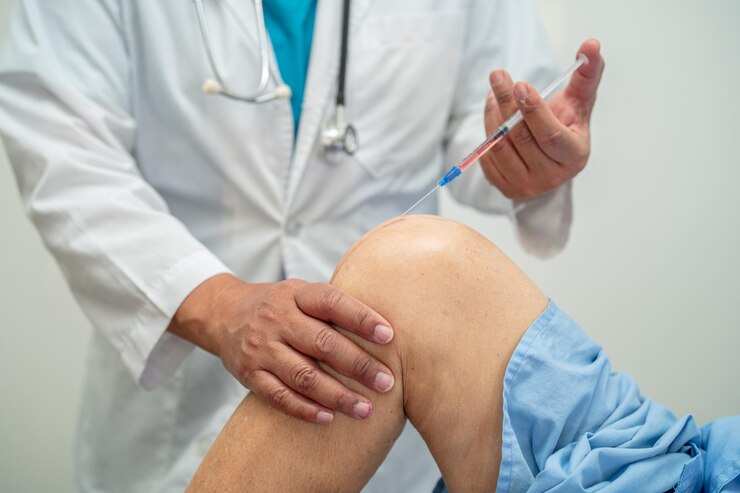Knee osteoarthritis can cause chronic pain, aggravating stiffness, and a reduced ability to do the little things you enjoy. It may even impair your ability to move normally. As there are a variety of treatments for knee pain and other types of knee pain, such as oral pain relievers, steroid injections, chiropractic, and dietary changes, Hyaluronic Acid Injections are an excellent option.
Hyaluronic Acid Injections, also known as visco supplements, a natural-looking gel is injected into your knee joint. This gel is similar to the hyaluronic acid found naturally within your joints’ synovial fluid—injections of hyaluronan act as a shock absorber and lubricant.
This lubricant can aid in the smoother movement of painful joints, reducing discomfort and improving function. The treatments can be a lifesaver for some people, but they don’t work for everyone. Continue reading to know How Effective the Injections are:
About Hyaluronic Acid Injections
The injections help treats knee pain induced by osteoarthritis (OA) in patients who fail to respond to painkillers such as acetaminophen and other treatments.
Hyaluronic acid is a naturally occurring substance in our joints. It ensures the joints work efficiently by acting as lubricants and knee shock absorbers.
The medication should only be administered by or under the supervision of a professional doctor. The dosage forms available for this product are in the form of a Gel or Jelly substance. The other comes in the form of a solution.
How Effective Are the Treatments?
Hyaluronic acid injections have been shown in studies to be more effective than pain medication for some people with OA. According to other studies, they may also work and corticosteroid knee injections.
Some people seem to respond better to hyaluronic acid injections than others. In seniors and people suffering from severe OA, they may be less effective.
Is It Going to Fix Everything?
Unfortunately, the answer is no. Injections of hyaluronic acid will not help treat all severe knee conditions. On the other hand, injections can be remarkably effective in treating osteoarthritis. The lining of your knees can be replenished with hyaluronic acid injections providing pain management for at least half a year.
However, the injection is ineffective compared to other knee conditions like ligament tears, sprains and tendinitis. The lining of your joints gets restored with hyaluronic acid injections, but your tissue is not repaired.
Also, according to studies, between 30% and 40% of patients who receive hyaluronate knee injections do not experience pain relief or improved function. However, those who benefit from the injections may be more effective than medications. It’s unclear why some people feel better after the injections while others don’t.
Even if the injections help reduce pain and improve function, they don’t stop the disease from progressing. Knee injections with hyaluronate can make you feel better, but they won’t fix the underlying cause of your osteoarthritis.
Results from the treatment appear 4-12 weeks after the first injection for those who do find relief. Relief may last up to six months, and some people may be eligible for a benefit that lasts even longer.
What Are the Advantages of Injecting Hyaluronic Acid?
Despite the treatment not having 100 percent effectiveness, it has some benefits, which makes many patients recommend it. Below are a few of them;
- Lubrication: Hyaluronic acid, also known as hyaluronan, has a high viscosity, allowing it to absorb shock and provide lubrication to knee joints. It aims to minimize friction within joints, which reduces pain, stiffness, cartilage and bone loss.
- Pain Relief: Hyaluronic acid molecules, in some cases, form a barrier around nerve cells in the knee, preventing pain signals from reaching the brain. Reduced friction in the knee also helps to keep pain at bay.
- Minimal Side Effects: Hyaluronic acid injections have fewer side effects than steroid injections. You may experience minor pain and a small amount of joint fluid build-up after an injection, but these are only temporary side effects that go away after a few days. In rare instances, the intravenous administration can cause an increase in inflammation, for which case a physician will immediately stop treatment.
- Minimal Recovery Time: After receiving an injection, you should be able to resume your normal activities right away. However, for the first two days after the injections, avoid strenuous activities like running and heavy lifting.
Methods Used to Administer the Hyaluronan Injection
A hyaluronan injection will be given to your joint. The process is known as an Intra-articular injection.
A medical specialist will examine you thoroughly and discuss whether or not the injection is appropriate for you. The infusion will be administered to you. Depending on which brand is available at the healthcare you visit, you may receive one to five injections one week apart.
During the treatment periods, it’s advisable to avoid jogging, high-impact sports, and excessive activity for at least two days after the injection. Lifting heavy items or standing for long periods should also be avoided.
You won’t notice the injections’ effects right away. Once they begin working, any benefits they receive will last only a few months.
What to Expect During the Hyaluronic Acid treatments
Depending on which type your doctor uses, you may only need one shot during the treatment. Alternatively, three to five injections spaced a week apart will be administered.
For all types, the injection is given in the same way. The doctor begins by cleaning the area. If your knee swells from too much fluid, your doctor may administer a local anesthetic before inserting a needle into the joint to drain it. The doctor can usually inject hyaluronic acid into the knee joint while keeping the same needle.
You should avoid heavy weight-bearing activity for one or two days after receiving an injection. Otherwise, you should be able to return to your routine after a few days.
When Should You Avoid Hyaluronic Acid Injections?
Some people may not be candidates for hyaluronic acid injections, including but not limited to:
- Pregnant and breastfeeding women
- Adolescents and children
- People who are suffering from bacterial or other infections on their knees
- People who have a known hyaluronate allergy
- People with allergic reactions to eggs and poultry products should also tell their doctor because some hyaluronate items are gels, and solutions are made from rooster combs; they may not be appropriate for these patients
Also, if you are healthy but have the following conditions, you will not be able to receive hyaluronan injections:
- An infection in your knee or the skin around your knee, such as haemophilia
- Specific allergies that cause excessive bleeding or blood clotting disorder
What Should You Expect After the Hyaluronic Acid Injections?
Hyaluronic acid injections affect people in different ways. The irritation and pain in your knees may go away almost immediately or take a few weeks. You’ll soon notice that you can now move more freely and without much pain.
The majority of people experience pain management treatment for 4-6 months. The treatments are recommended every six months as advised by the therapist, depending on the extent of your condition. Many users reported that these treatments give sufficient relief that they can postpone or even avoid having their knees replaced.
This is particularly beneficial for those who have had a painful knee injury, as this increases your chances of developing early signs of osteoarthritis.
The most common type of arthritis is osteoarthritis. It’s a degenerative condition that develops over time when the protective cartilage that cushions your bones wears down. As the damage cannot get reversed, the symptoms are manageable with exercise, a healthy diet, medication. If the first option doesn’t work, Hyaluronic Acid Injections should be your next option.
Related Articles
- What Are Hyaluronic Acid Injections?
- Hyaluronic Acid Injections: Potential Side Effects
- Ostenil Plus: Hyaluronic Acid Injections
- Hyaluronic Acid Injections FAQs
- Understanding Osteoarthritis of the Knee



